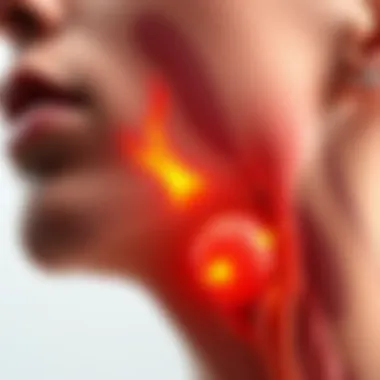Understanding the Burning Sensation in the Throat


Intro
The burning sensation at the back of the throat is more common than one might think. While it can appear as a minor nuisance, it often carries with it a range of underlying issues, some more serious than others. Understanding the causes, symptoms, and relevant treatments is crucial not just for relief but for overall health management. This sensation may be a mere consequence of a spicy meal consumed too quickly, or it could hint at something more concerning, such as gastroesophageal reflux disease (GERD) or throat infections.
Getting to the root of the burning sensation requires a bit of exploration. Various elements—including diet, stress, and lifestyle choices—contribute to throat health. This article takes a closer look at these factors to paint a more substantial picture.
Now, let’s explore the health benefits that can stem from maintaining good throat health.
Health Benefits
Physical Health Benefits
When we address the burning sensation in the back of the throat, we inadvertently open the door to a broader topic: our overall physical health. Identifying and managing throat discomfort is not just about soothing an irritation; it can lead to multiple health benefits:
- Improved Swallowing: When the throat is healthy, swallowing food and liquids becomes easier and less painful.
- Better Nutritional Absorption: A healthy throat means less pain while eating, allowing for a more balanced diet without avoidance of certain foods due to discomfort.
- Reduced Risk of Infections: Proper throat care can help in minimizing the chances of infections, thereby ensuring a robust immune response.
Mental Health Benefits
The mind-body connection plays a significant role in our overall well-being, and the throat is not excluded from this phenomenon. Here’s how addressing throat issues can indirectly boost mental health:
- Stress Relief: Chronic discomfort in the throat can lead to heightened stress levels. When pain is alleviated, it paves the way for a more tranquil state of mind.
- Improved Communication: A clear, pain-free throat enhances spoken communication, lessening social anxiety that may arise in situations where verbal expression is necessary.
- Increased Quality of Life: Feeling comfortable and pain-free naturally contributes to a more positive outlook on life.
"Good health isn’t merely the absence of disease; it’s the harmonious functioning of the body and mind."
Managing the burning sensation in the throat isn’t just about quick fixes; it involves consistent maintenance and understanding the broader implications for your health.
Practical Tips
Healthy Eating Guidelines
Your diet plays a pivotal role in throat health. Areas to consider include:
- Balanced Diet: Emphasize fruits, vegetables, whole grains, and lean proteins. A variety of nutrients helps keep bodily functions in check.
- Hydration: Drink sufficient water to keep your throat moist and reduce the likelihood of irritation.
- Avoid Triggers: Identify and limit spicy, acidic, or overly hot foods that may exacerbate sensations of burning.
Effective Lifestyle Routines
In addition to diet, several lifestyle adjustments can help maintain throat health:
- Regular Routine: Establishing a consistent sleep and eating schedule can alleviate stress on the digestive system, thereby minimizing throat discomfort.
- Mindfulness: Practices such as deep breathing, meditation, or yoga can mitigate stress levels, creating a more favorable environment for your throat.
By incorporating these elements into daily life, one can not only alleviate the burning sensation but also promote overall well-being, ensuring both physical and mental health are in sync.
For further reading, you can explore articles on throat health at Mayo Clinic and Harvard Health.
Prologue
The burning sensation in the back of your throat can be bothersome, often leading to an array of questions about its origin and implications. It’s not just a fleeting discomfort; it can serve as a signal from the body, indicating various underlying factors that may warrant attention. Understanding this sensation is essential, especially for individuals who routinely encounter throat issues or those who are simply curious about the mechanics of their bodies.
In this article, we will delve into the anatomy of the throat and explore common causes for this burning feeling. It’s vital to note that whether it manifests occasionally or becomes a persistent issue, the way we approach and interpret this discomfort can significantly impact our overall health.
By shedding light on symptoms to observe and when to seek medical advice, we aim to empower readers. The importance of awareness cannot be overstated; recognizing the subtle nuances of throat health can inform lifestyle adjustments and encourage effective habits.
This journey will also highlight how factors such as diet, stress, and environmental influences interplay with our throat's well-being. As we navigate through the potential causes and management strategies, our focus will be on fostering an understanding that equips readers to make informed decisions regarding their health.
This is especially relevant for health professionals, wellness coaches, and nutritionists, who might encounter clients grappling with such issues. Recognizing and responding to this burning sensation is not merely about discomfort; it’s about advocating for a holistic view of health that intertwines body and mind.
Becoming attuned to our body's signals can be the first step toward a healthier lifestyle.
The Anatomy of the Throat
Understanding the anatomy of the throat is crucial when exploring the burning sensation in the back of the throat. This discomfort can be tied not just to the feelings we experience but also to the intricate workings, structures, and interconnections within this vital area. Knowing the layout and functions of the throat can provide valuable insights into potential causes and treatment methods.
Structure and Function
The throat, or pharynx, serves as a passageway for both air and food. Structurally, it consists of three essential parts: the nasopharynx, oropharynx, and laryngopharynx. Each of these segments plays distinct roles in our respiratory and digestive systems. For instance, when we swallow, the oropharynx kicks into gear, directing food down the esophagus, while the nasopharynx handles airflow during breathing.
- Nasopharynx: Located at the back of the nose, this area connects the nasal cavity to the throat. It plays a vital role in proper air circulation and can be affected by allergies or infections, which sometimes contribute to a burning sensation.
- Oropharynx: This is the portion that lies behind the mouth. It is where food and air mix momentarily. Health issues here often lead to aches or irritation, manifesting as that unsettling burning feeling.
- Laryngopharynx: This is the final section before it splits into the esophagus and the larynx. It’s essential for protecting against airway obstruction when swallowing.
In keeping with the throat’s functions, an interesting aspect to consider is how the throat goes about defending itself against constant potential threats. Mucous membranes line the throat, maintaining moisture and trapping harmful microorganisms. This natural defense mechanism is why persistent dryness might be a red flag; if these membranes are not adequately moistened, they can elicit a burning sensation.
Important Note: A well-informed understanding of anatomical features is essential for identifying symptoms of potential disorders or inflammation that lead to discomfort.


Common Throat Disorders
When assessing common disorders associated the throat, several conditions can prompt a burning feeling at its back. Here is a detailed look at some of the more prevalent contenders:
- Pharyngitis: Inflammation of the throat, often due to viruses or bacteria. Symptoms can include a burning sensation, especially when swallowing.
- Tonsillitis: This condition involves the inflammation of the tonsils, located at the back of the mouth. It can lead to a sore throat accompanied by a burning sensation.
- Laryngitis: When the larynx becomes inflamed. This condition may result in a hoarse voice along with that burning feeling when speaking or swallowing.
- Gastroesophageal Reflux Disease (GERD): This is a significant contributor to throat discomfort. Stomach acids flowing back can irritate the lining of the throat.
- Allergic Reactions: Seasonal allergies can cause inflammation in the throat, leading to persistent irritation, burning, and discomfort.
Identifying these disorders and knowing their symptoms is beneficial. It allows one to proactively seek care or implement lifestyle changes that can alleviate the discomfort. By approaching throat health with an informed perspective, individuals can not only reduce discomfort but also improve their overall quality of life.
Recognizing the Burning Sensation
Recognizing the burning sensation in the back of the throat is crucial for understanding overall throat health. This discomfort might seem like a mere nuisance at first, but often it's a barometer for underlying issues that need attention. By honing in on this symptom, individuals can take proactive steps toward managing their health. Ignoring the signs could lead to prolonged discomfort or even more serious medical conditions. Therefore, being attuned to the body's signals is not just important; it can be a life-saver.
Symptoms to Observe
When dealing with a burning sensation in the throat, taking note of accompanying symptoms can provide invaluable clues. Here are some observations to make:
- Duration of Discomfort: Is it persistent or does it come and go? A lasting sensation might indicate a chronic issue.
- Associated Pain: Is there any pain radiating to the ears or jaw? Such sensations could hint at a more complex issue.
- Swallowing Difficulties: Experiencing pain during swallowing is pivotal, so keep track of any changes.
- Presence of Other Symptoms:
- Coughing: A cough may suggest an infection or irritation.
- Fever: If there's a fever alongside the burning sensation, it may signal an infection.
- Nasopharyngeal Symptoms: Congestion or post-nasal drip often aggravate throat issues.
These observations form a useful checklist for self-assessment and can guide the conversation with healthcare providers.
When to Seek Medical Advice
Knowing when to seek medical advice can make all the difference. Some scenarios prompt a quick trip to the doctor:
- Severe Pain: If the burning sensation transforms into severe pain, it's time to get a professional opinion.
- Persistent Symptoms: If the discomfort lingers for more than a week, don’t brush it off.
- Breathlessness: Any new difficulty in breathing accompanying the throat issues warrants immediate medical attention.
- Swollen Lymph Nodes: Swollen glands in the neck can indicate a serious infection and should be evaluated.
Remember, early intervention often leads to quicker recovery. Health care professionals advise keeping a detailed diary of symptoms, which can provide valuable insights during consultations.
By being diligent in monitoring symptoms and understanding when to consult a medical professional, individuals can effectively navigate their throat health, leading to swift resolution of discomfort.
Potential Causes of Burn in Throat
Understanding the potential causes behind a burn in the throat is crucial for both identifying the problem and exploring effective treatment options. This section digs deep into various elements that can lead to discomfort in this area. Being aware of these catalysts can empower individuals to make informed health choices and grasp when further medical intervention may be necessary.
Acid Reflux and GERD
Acid reflux occurs when stomach acid flows back into the esophagus, causing irritation and discomfort. This return flow can lead to that burning sensation many people report feeling at the back of the throat. Gastroesophageal reflux disease (GERD) is a more serious form of acid reflux that requires more dedicated management. When the acid reaches up to the throat, not only does it cause burning, but also potential long-term damage if left untreated.
To tackle this issue, lifestyle changes can be prominent in reducing occurrences. Eating smaller, more frequent meals, avoiding greasy and spicy dishes, and not lying down right after eating can help mitigate symptoms.
Allergies and Environmental Factors
Allergies can trigger inflammation in the throat, bringing on redness and that burning sensation. Pollens, dust mites, and pet dander are just a few culprits that can aggravate the throat's sensitive lining. Environmental pollutants, such as smoke or chemical fumes, can also irritate the throat, making individuals feel discomfort that often gets mistaken for infection.
Managing exposure to allergens is key – using air purifiers or wearing masks in high-allergen areas can aid greatly. Additionally, antihistamines or allergy shots may be recommended depending on the severity.
Infections and Inflammations
Throat infections, such as viral or bacterial infections, can play a profound role in causing burning sensations. Conditions like pharyngitis or tonsillitis can lead to inflammation that results in a sore and burning throat. Typically, these conditions are accompanied by other symptoms, including a cough or fever, which can help in identifying them.
To combat infections, over-the-counter medications or prescription antibiotics may be necessary. Staying hydrated and gargling with salt water can be soothing during the healing process.
Respiratory Issues
Respiratory problems, such as asthma or chronic bronchitis, can also lead to throat irritation. An exacerbation of these conditions often results in coughing fits that can further irritate the throat, making it feel raw or inflamed. For individuals who use inhalers, the medication can sometimes dry out the throat even when helping with airway symptoms.
A collaborative approach with healthcare providers can be beneficial for managing symptoms related to respiratory issues. Moreover, using a humidifier at home can help maintain moist air and ease throat discomfort.
Lifestyle Factors and Habits
Certain lifestyle choices can contribute to throat discomfort. For instance, smoking and excessive alcohol consumption can irritate the throat lining, leading to that familiar burning sensation. Additionally, consuming very hot beverages or foods can physically burn the throat over time.
Making mindful choices, such as reducing exposure to tobacco smoke, drinking warm rather than hot beverages, and limiting alcohol can positively impact throat health. Regular check-ins with a healthcare professional can aid in tailoring lifestyle adjustments that suit individual needs.
It’s essential to recognize that while one particular factor might spark throat irritation, often, multiple causes intertwine, creating a complex puzzle of symptoms.
Understanding these potential causes plays a pivotal role in not just alleviating the burning sensation in the throat, but also in promoting overall throat health. Discussing symptoms with a medical professional can help rule out serious conditions and plot a course to wellness.
Impact of Diet on Throat Health
Diet plays a substantial role in maintaining the health of the throat, influencing both the frequency and intensity of a burning sensation. The foods we consume can either aggravate existing conditions or promote healing, making dietary choices crucial for well-being. A keen understanding of how diet affects the throat can guide individuals to make informed decisions tailored to their specific needs and health concerns.


The throat is sensitive and subject to various irritants, and dietary habits can either alleviate or exacerbate these irritants. For instance, incorporating soothing, anti-inflammatory foods can serve as a natural remedy, while others can provoke discomfort and irritation. Thus, individuals experiencing sensations of heat or burning must pay attention to their plates. The concept of food as both medicine and a potential source of distress rings true in this context, highlighting the delicate balance between nourishment and irritation.
Foods That Trigger Discomfort
Certain foods are notorious for triggering discomfort in individuals with throat issues. Identifying these irritants can significantly improve one's throat health. Common culprits include:
- Spicy foods: Chilis and certain spices can ignite a fiery sensation.
- Acidic foods: Citrus fruits, tomatoes, and vinegar can increase acidity levels, leading to irritation.
- Fried and greasy foods: These tend to relax the lower esophageal sphincter, possibly allowing stomach acids to creep back into the throat.
- Rough-textured foods: Items like crusty bread or certain chips may scratch or irritate the throat lining.
- Dairy products: Some people find that milk products thicken mucus, worsening the sensation in the throat.
Avoiding these foods can sometimes mean the difference between a calm throat and constant discomfort. Keeping a food diary can help pinpoint troubling foods, leading to better dietary choices in the future.
Nutritional Support for Healing
Conversely, there are foods that can support healing and soothe throat discomfort. Adopting a nutrient-rich diet will offer the body what it needs to fend off inflammation and promote recovery. Some key elements to consider include:
- Honey: Renowned for its soothing properties, honey can coat the throat and provide relief from irritation. It has natural antibacterial features that further aid in healing.
- Ginger: Known for its anti-inflammatory effects, ginger can help calm the linning of the throat. Whether in teas or as a spice, it's a worthwhile addition to the diet.
- Bone broth: Full of nutrients, broth not only hydrates but also contains compounds that can promote healing in the throat.
- Leafy greens: Rich in vitamins, these greens boost the immune system, helping the body combat infections that might cause a burning sensation.
- Oatmeal: This soothing food is easy to swallow and can prevent further irritation while providing essential nutrients.
Incorporating these healing foods into a daily diet, along with an avoidance of irritating ones, can create a protective barrier for the throat and improve overall health.
Ultimately, understanding the impact of diet on throat health underscores the connection between what we eat and how we feel. Being mindful about food intake can foster not just a healthy throat but also an improved quality of life.
For more information on effective dietary practices for throat health, check resources like Healthline or Mayo Clinic.
Home Remedies and Management Strategies
Home remedies and management strategies play a significant role in addressing the burning sensation in the back of the throat. Understanding effective at-home practices can empower individuals to manage their symptoms proactively. These strategies are not just throwaway solutions; they offer various pathways to comfort and recovery. By incorporating natural remedies, staying hydrated, and establishing a soothing routine, individuals can work toward alleviating discomfort while also reinforcing their overall throat health.
Natural Remedies
Natural remedies are often the first line of defense for those experiencing throat discomfort. Many individuals turn to accessible, non-invasive solutions to find relief without immediately resorting to pharmaceutical interventions. Here are several widely used natural remedies:
- Ginger Tea: Known for its anti-inflammatory properties, ginger can reduce irritation. Brew a slice of fresh ginger in hot water and sip it slowly.
- Honey: A spoonful of honey can coat the throat, providing relief from the burning sensation. It possesses antimicrobial properties that may benefit throat health.
- Saltwater Gargle: Mixing half a teaspoon of salt in warm water and gargling is an age-old remedy. It can help reduce swelling and kill bacteria in the throat.
- Licorice Root Tea: Not just a candy flavor, licorice root helps soothe the throat’s lining. Steep it in hot water and enjoy the sweet taste.
Each of these remedies can provide temporary relief and may aid in healing. However, one must be aware that individual responses can vary; what's a miracle for one might not work for another.
Hydration and Its Importance
Staying hydrated can’t be overstated when it comes to maintaining throat health. Proper hydration keeps the throat moist and lessens discomfort caused by dryness or irritation. Here are a few important considerations regarding hydration:
- Warm Beverages: Drinking warm herbal teas or broths can be more soothing than cold beverages, as they help ease the burn.
- Water Intake: Aim for at least eight 8-ounce glasses of water a day, or more if your throat feels particularly irritated.
- Avoid Irritants: Steer clear of caffeinated or sugary drinks, as they can dehydrate the body and worsen throat discomfort.
By making a conscious effort to hydrate regularly, individuals can support their throat health and potentially reduce the likelihood of experiencing that burning sensation.
Establishing a Soothing Routine
Creating a soothing routine is fundamental for holistic management of throat discomfort. By developing a series of actions that foster comfort, individuals can make significant strides toward symptom relief. Here’s how to craft your soothing routine:
- Establish Time for Rest: Make time for adequate sleep and rests. Resting the voice can minimize irritation, particularly if overused.
- Daily Herbal Ingestion: Incorporate herbal remedies known for throat health into your daily routine. Whether it's chamomile or elderberry, choose what appeals to you.
- Mindfulness and Relaxation Techniques: Engaging in activities such as meditation or gentle yoga can help reduce stress, which is known to impact throat health negatively.
By prioritizing self-care and developing a routine that integrates these elements, individuals can create an environment conducive to healing.
In the journey to managing throat discomfort, understanding and integrating home remedies and effective strategies helps individuals take charge of their throat health. It transforms their experience from discomfort to management, allowing for greater control and understanding.
Medical Treatments and Interventions
The burning sensation in the back of the throat is not just an annoyance; it can signify a deeper issue that might require medical intervention. Understanding the various medical treatments and interventions available can equip individuals with the knowledge needed to address their throat discomfort effectively. This section emphasizes the importance of identifying appropriate treatment options that cater specifically to underlying causes, whether they be infections, chronic conditions, or lifestyle choices. The right medical approach can significantly alleviate discomfort and improve overall throat health.
Pharmaceutical Options
Pharmaceuticals play a crucial role in managing the symptoms associated with throat discomfort. Depending on the underlying cause, a variety of medications may be utilized.
- Antacids: For instances where acid reflux contributes to the burning sensation, over-the-counter antacids like Tums or Rolaids may provide quick relief by neutralizing stomach acid.
- -Receptor Antagonists: Drugs such as ranitidine and famotidine limit the production of stomach acid and are often recommended for more severe cases.
- Proton Pump Inhibitors (PPIs): Medications like omeprazole can be beneficial for chronic acid reflux, reducing the amount of acid produced, thus minimizing throat irritation.
- Antihistamines: If allergies are deemed the culprit, antihistamines like diphenhydramine can help relieve symptoms. However, they may cause dryness, which should be monitored.
- Prescription Medications: In more severe situations, doctors may prescribe stronger medications tailored to specific conditions, such as corticosteroids for inflammation or antibiotics if a bacterial infection is diagnosed.
It's pivotal for individuals to consult healthcare providers to ensure they select suitable medications tailored to their unique medical history and health conditions. Just because something is available over-the-counter doesn’t mean it is ideal for everyone.
Therapeutic Procedures
When medications do not yield the desired results, therapeutic procedures may be necessary to tackle the underlying causes of throat discomfort.
- Endoscopy: This minimally invasive procedure involves using a thin, flexible tube with a camera to examine the throat and esophagus. This can be particularly useful for diagnosing serious conditions like esophagitis or strictures.
- Laser Therapy: Used to treat abnormal growths or lesions within the throat, laser therapy can effectively minimize persistent symptoms caused by anatomical irregularities.
- Injections: In some cases, injections of corticosteroids may be administered to reduce inflammation in the throat, offering a remedy for chronic irritation.
These procedures underscore the importance of having a healthcare professional's guidance when navigating treatment options. They can determine the most effective approach based on an individual’s specific symptoms and needs.


"Understanding the right medical pathway can aid in achieving relief and enhancing quality of life, especially in persistent cases of throat discomfort."
Preventative Measures
Understanding the burning sensation in the back of the throat extends beyond merely addressing its symptoms. Prevention often proves more effective than dealing with issues after they arise, especially when it comes to throat health. Recognizing potential risk factors and making a conscious effort to modify behavior can provide significant benefits in maintaining comfort and well-being.
Implementing preventative measures can lead to better quality of life. The simple act of avoiding triggers that may exacerbate throat discomfort, like certain foods or environmental factors, plays a sizable role. For instance, people often overlook how spicy foods, excessive caffeine, or acidic elements in their diet might contribute to irritation. Adjusting eating habits can work wonders, providing a more soothing experience for a sensitive throat. Here are some key considerations to keep in mind:
- Avoid irritants: Reduce exposure to cigarette smoke, pollutants, or allergens. These irritants can worsen throat sensitivity and contribute to discomfort over time.
- Stay hydrated: Drinking ample water not only soothes but also keeps mucus membranes moist, which can ward off unnecessary pain.
- Practice good oral hygiene: Regular brushing and gargling can help eliminate bacteria that may contribute to throat issues.
- Limit throat strain: Excessive shouting or talking, especially in noisy environments, can lead to vocal fatigue and sore throats.
"An ounce of prevention is worth a pound of cure."
Beyond these direct strategies, the significance of personal habits cannot be overstated. Simple lifestyle adjustments can serve as the foundation for not just throat health but overall wellness. Building a supportive environment, both physically and mentally, enhances resilience against throat irritations. Investing a little time into daily rituals can yield substantial rewards for health.
Lifestyle Adjustments
Making lifestyle modifications is pivotal in preventing throat discomfort. The trick is to recognize what changes can be initiated on an individual basis. Even small tweaks can lead to major improvements without requiring an overhaul of one's routine. Some impactful adjustments include:
- Balanced Diet: Incorporating an array of nutrients—lean proteins, fruits, and vegetables—can foster improved immune function, aiding the body in fighting off infections that cause throat irritation.
- Regular Exercise: Physical activity enhances blood circulation, which can be beneficial for the body’s overall healing processes.
- Adequate Sleep: Quality sleep can bolster your immune system, keeping it robust enough to shield against throat irritations.
The underlying notion with these adjustments is to fortify your body’s ability to combat potential triggers and stresses that may lead to burning sensations. Although it may feel daunting at first, as these habits become part of your life, they can turn into second nature, ultimately decreasing your risk of experiencing discomfort.
Stress Management Techniques
Stress has a notorious reputation for exacerbating various health issues, including sensations in the throat. A burning feeling can be compounded by stress, which tends to trigger behaviors that fuel discomfort—like clenching the jaw or holding tension in the neck and shoulders. Managing stress effectively is thus crucial.
Consider these techniques:
- Mindfulness and Meditation: Implementing breathing exercises or meditation can help alleviate tension. Just a few minutes a day can create a marked change in how your body reacts to stress.
- Physical Activities: Engaging in yoga or tai chi can aid in reducing tension while enhancing body awareness and flexibility.
- Setting Boundaries: Learning to say no or delegating tasks can prevent overwhelm. Protecting your time and energy is critical for mental well-being.
"Take it easy, one step at a time."
By practicing these techniques, individuals create a reservoir of tools to draw from during stressful times. This proactive approach can significantly mellow the impact stress has on throat health, helping to maintain a calm and pain-free throat. As the saying goes, it’s always better to be a step ahead than scrambling to catch up when issues arise.
Taking charge of one’s health is a commendable pursuit. Through lifestyle adjustments and effective stress management techniques, individuals can dramatically reduce the risk of experiencing discomfort, fostering a resilient state of overall health.
When Symptoms Persist
Experiencing a persistent burning sensation in the back of the throat can be quite alarming. It is not just a fleeting discomfort but rather a signal that shouldn’t be ignored. This section serves to illuminate why understanding and addressing these persistent symptoms is crucial for overall health. The interaction of throat sensations with daily living can heavily influence one's quality of life and comfort.
When symptoms linger beyond the usual timeframe, it can indicate underlying conditions that warrant further investigation. While a temporary irritation may stem from seasonal allergies or a mild infection, persistence often suggests the need for a deeper look into chronic issues.
Additionally, recognizing the seriousness of ongoing throat discomfort can lead to early intervention and potentially better outcomes. Here's what you should consider:
- Quality of Life Impact: Persistent burn can interfere with eating, speaking, and even sleeping, leading to frustration and anxiety.
- Mental Health Considerations: Ongoing symptoms might contribute to increased stress and anxiety. Understanding the connection between physical and mental health is crucial.
- Potential Late Diagnosis: Delaying medical advice can lead to complications, making it harder to manage the original problem.
Staying vigilant about the body's signals is important. Ignoring these persistent symptoms could potentially delay an accurate diagnosis or necessary treatment. Attention to what your body tells you becomes critical.
Quote: The body often communicates its needs through discomfort. Listening closely can provide the key to avoiding bigger health issues down the road.
Understanding Chronic Conditions
Chronic conditions related to a burning sensation in the throat can include gastroesophageal reflux disease (GERD), allergies, or even autoimmune disorders. Understanding these conditions not only empowers you but also guides conversations with healthcare providers.
- Gastroesophageal Reflux Disease (GERD): Often presents as a burning sensation due to stomach content backing up into the esophagus. It can be exacerbated by certain foods and habits.
- Chronic Allergies: Environmental allergens can cause ongoing irritation and inflammation in the throat. An allergy specialist can provide diagnostic testing.
- Autoimmune Disorders: Conditions such as Sjögren's syndrome can dry out mucous membranes, leading to discomfort that feels like a burning sensation.
Diagnosis can involve a range of tests, including endoscopies and allergy assessments. Knowing the specifics of how these chronic issues manifest helps in seeking targeted treatment.
Consulting Specialists
When faced with persisting symptoms, it’s important to have a plan for consulting healthcare professionals who specialize in throat-related issues. The first line of defense may be a primary care provider, but they may refer you to specialists as needed.
- Otolaryngologist (ENT): These experts can perform comprehensive evaluations of the throat. They can also examine structures more closely, looking for polyps, infections, or other anomalies.
- Gastroenterologist: If GERD is suspected, a gastroenterologist might be the next stop. They can provide insights into digestive causes and might suggest procedures like an upper endoscopy.
- Allergist: For symptom relief tied to environmental factors, consultations with an allergist may help identify triggers with testing and tailored interventions.
In summary, persistent symptoms require a more focused approach and appropriate medical guidance. Finding and addressing the root causes of discomfort early can make a significant difference.
Closure
In wrapping up the exploration of the burning sensation in the back of the throat, it becomes clear that understanding this condition is not just about recognizing the discomfort; it’s an essential step for health-conscious individuals aiming to maintain or improve throat health. The intricate interplay between various causes—ranging from dietary choices to medical conditions—underscores the importance of a holistic approach.
For health professionals, wellness coaches, nutritionists, fitness trainers, and mindfulness instructors, being equipped with knowledge about this sensation is paramount. It aids in assessing clients' complaints accurately and recommending appropriate interventions. One may say that having a comprehensive understanding empowers professionals to tailor their strategies more effectively, making their guidance more impactful.
Benefits of Awareness
Being aware of the underlying factors can lead to earlier intervention, potentially preventing chronic issues. It also encourages proactive measures, like adopting better dietary habits or stress management techniques.
"A stitch in time saves nine," as the saying goes; recognizing and addressing throat discomfort early can mitigate further complications down the line.
Additionally, this article serves as a reminder that what we put into our bodies—be it food, beverages, or even our daily habits—can significantly influence our physical sensations. It's not merely about alleviating discomfort; it’s about fostering overall wellness.
To summarize, by understanding the causes, impacts, and management strategies associated with the burning sensation in the throat, individuals can advocate for their health more effectively. This knowledge not only enriches practitioners' toolkit but fosters a deeper connection between lifestyle choices and throat health.















